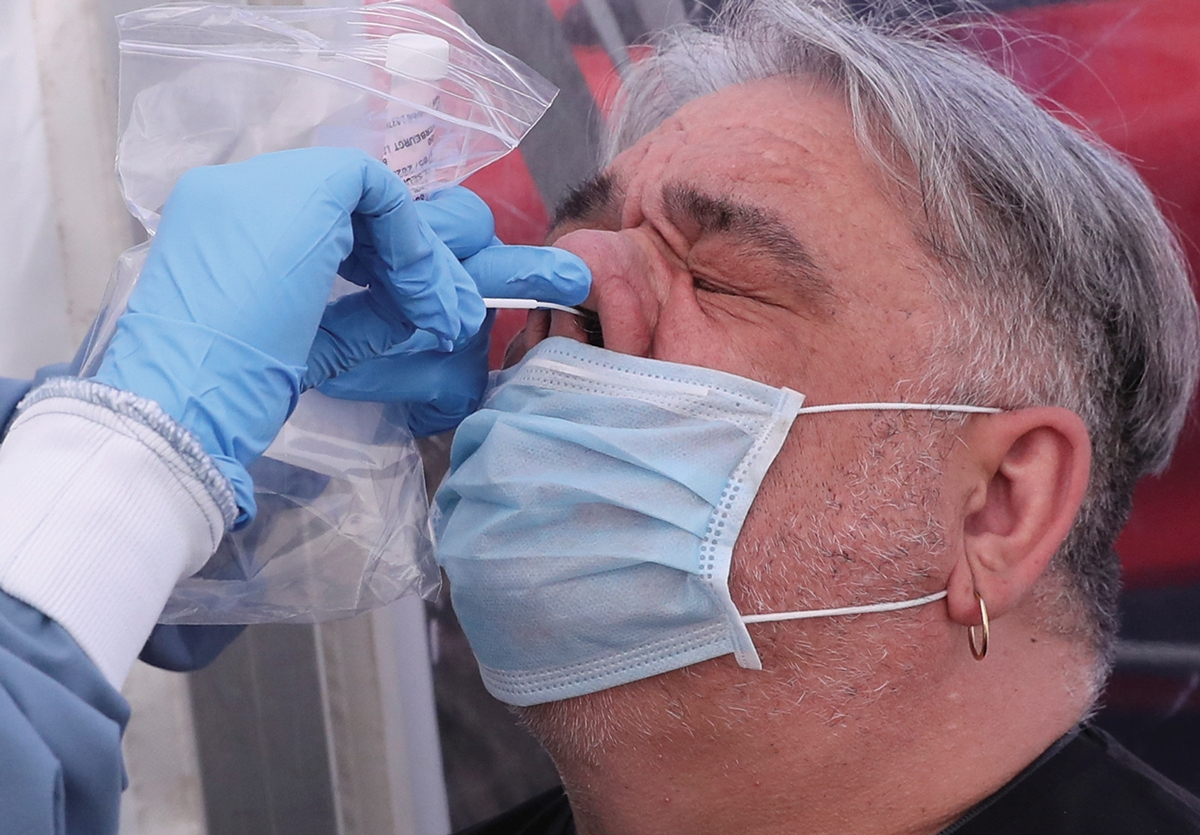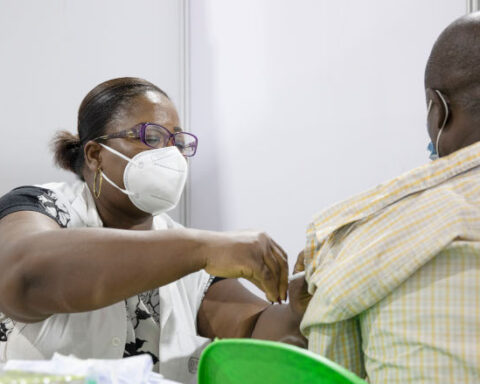- Nasal sampling allows for collection of the sample from the front area of the nose instead of the nasopharynx resulting on a less invasive testing experience for patients
- The test also provides patients with the option to self-collect their nasal sample
Basel, 01 February 2021 – Roche (SIX: RO, ROG; OTCQX: RHHBY) today announced it has obtained the CE mark for its new SARS-CoV-2 Rapid Antigen Test Nasal. The test will be available in countries accepting the CE mark by mid-February 2021.
In comparison to the existing Roche SARS-CoV-2 Rapid Antigen Test, the SARS-CoV-2 Rapid Antigen Test Nasal collects the sample from the front area of the nose instead of the nasopharynx, resulting in a simplified and faster testing procedure1. This testing method can help reduce overall patient discomfort, particularly in sensitive individuals such as children, elderly people and/or people with disabilities.
Besides being less invasive, the test also provides patients with the option to self-collect their nasal sample under the supervision of a healthcare professional. Through reduced physical contact, this method of testing can help to decrease the risk of exposure to the virus for healthcare professionals. Whether the test could also be used without supervision of a healthcare professional will depend on local regulatory requirements.
“Rapid testing continues to play an important role in the fight against COVID-19, especially in places when laboratory testing is not available and quick results are needed, such as nursing homes, healthcare facilities, and schools.” said Thomas Schinecker, CEO Roche Diagnostics. “The SARS-CoV-2 Rapid Antigen Test Nasal provides patients with a more comfortable testing experience.”
The launch is a partnership with SD Biosensor Inc., with whom Roche has also launched a SARS-CoV-2 Rapid Antibody Test in July and a SARS-CoV-2 Rapid Antigen Test in September 2020. SD Biosensor, is currently preparing to submit an Emergency Use Authorisation (EUA) to the U.S. Food and Drug Administration (FDA).
The test is the latest addition to Roche’s comprehensive COVID-19 portfolio to support healthcare systems in diagnosing SARS-CoV-2 infection.
About the SARS-CoV-2 Rapid Antigen Test Nasal
The SARS-CoV-2 Rapid Antigen Test Nasal is a rapid chromatographic immunoassay for the qualitative detection of the nucleocapsid protein of SARS-CoV-2 present in human nasal specimens. In clinical studies, the SARS-CoV-2 Rapid Antigen Test Nasal showed a relative sensitivity of 90.6% (Ct value ≤ 30; 95 % CI: 75.0 % – 98.0 %) and a specificity of 98.6% for professionally collected samples. For self-collected samples a sensitivity of 84.4 % (Ct value ≤ 30; 95 % CI: 67.2 % – 94.7 %) and a specificity of 99.2% was detected. Overall the studies contained 468 symptomatic and asymptomatic individuals2. This test is intended to detect antigen from SARS‑CoV‑2 in individuals suspected of COVID‑19 or with known or suspected exposure to SARS‑CoV‑2.
This product is intended for professional use in laboratory and Point of Care environments, and/or self-collection under the close supervision of a healthcare worker.
About antigen testing
An antigen test detects proteins which are structural or functional components of a pathogen and are thus very specific to that pathogen3. In this case, the test would provide a qualitative “yes/no” answer on the presence of the pathogen in the patient sample and can be offered as a rapid strip test that is performed at the point of care. If the target antigen is present in sufficient concentrations in the sample, it will bind to specific antibodies and generate a visually detectable signal on the test strip, typically with results ready in 15 minutes. A rapid antigen test can reliably detect individuals with a high viral load allowing healthcare professionals to quickly identify those patients at greatest risk of spreading the infection.4
About Roche’s response to the COVID-19 pandemic
The COVID-19 pandemic continues to evolve globally with varying developments from country to country and we are partnering with healthcare providers, laboratories, authorities and organisations to help make sure that patients receive the tests, treatment and care they need. This new test is an additional step in Roche’s fight against the COVID-19 pandemic, which has already included:
- Launching COVID-19 diagnostic tests for active infection and the detection of antibodies in patients who have been exposed to the virus,
- Investigating treatments from our existing portfolio to better understand their potential to treat patients with COVID-19,
- Increasing manufacturing and supply chain capacity to meet product demand across our portfolio within the wider context of COVID-19 treatment, and
- Ensuring the supply of our existing medicines and diagnostics to patients around the world under exceptional conditions.
Reliable, high-quality testing is essential to help healthcare systems overcome this pandemic. On 13 March 2020 we received FDA Emergency Use Authorisation for a high-volume molecular test to detect SARS-CoV-2, the virus that causes COVID-19, which is also available in countries accepting the CE Mark. On 3 May 2020, Roche announced that its COVID-19 antibody test, aimed at detecting the presence of antibodies in the blood, also received FDA Emergency Use Authorisation and is available in markets accepting the CE mark. Also in June of last year we received an FDA EUA for the Elecsys® IL-6 test to assist in identifying severe inflammatory response in patients with confirmed COVID-19, as well as launching Roche v-TAC, which could help simplify the screening, diagnosis and monitoring of patients with respiratory compromise in the current COVID-19 pandemic. In July of 2020, we added a Rapid Antibody Test, with SD Biosensor as manufacturing partner, to the portfolio, that allows the detection of antibodies against COVID-19 at the point of care, a Rapid Antigen Test in September and a lab-based Antigen Test in December. Roche is working closely with governments and health authorities around the world, and has significantly increased production to help ensure availability of tests globally.
Roche is actively involved in understanding the potential of the existing portfolio and is researching options for the future. Roche has an ongoing clinical trial program evaluating the role of Actemra©/RoActemra© (tocilizumab) in COVID-19 pneumonia. On 29 July 2020 Roche announced that the COVACTA trial did not meet its primary endpoint of improved clinical status in patients with COVID-19 associated pneumonia, or the key secondary endpoint of reduced patient mortality. The study was the first global, randomised, double-blind, placebo-controlled phase III trial investigating Actemra/RoActemra in this setting. Roche remains committed to continuing the Actemra/RoActemra clinical trial programme in COVID-19 to further explore Actemra/RoActemra in other treatment settings, including in combination with an antiviral. In addition to COVACTA, Roche has initiated several studies to further investigate Actemra/RoActemra as a potential treatment for patients with COVID-19 associated pneumonia, including two phase III clinical trials, REMDACTA and EMPACTA, as well as the phase II MARIPOSA trial. Roche has further initiated an internal early research programme focused on the development of medicines for COVID-19 and is engaged in multiple research collaborations. On 19 August 2020, Roche announced a partnership with Regeneron to develop, manufacture and distribute REGN-COV2, Regeneron’s investigational antiviral antibody combination, to people around the globe.






